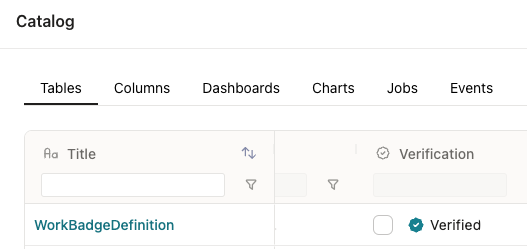Verified identifier
Verified tags in Secoda are another way to categorize your resources by giving them a "stamp of approval".
Secoda's Verified tag influences search ranking and is a good indicator for end users that the verified data has been approved by relevant stakeholders. This gives those users confidence is using these resources.
Check out our best practices documentation for Admins and Editors who are interested in implementing a Defining resources workflow.
Benefits of Verifying Resources
Verifying data through verified tags in Secoda can provide several benefits to organizations:
Improved data quality: By verifying data through verified tags, organizations can ensure that their data assets are of high quality and can be trusted by others. This can help reduce the risk of errors or inconsistencies and improve the overall quality of the data.
Enhanced data governance: Verified tags can help organizations establish clear standards for data quality and ensure that data is being used appropriately. This can help improve data governance and ensure that data is being used in a responsible and ethical manner.
Improved data discovery: Verified tags can influence search results, causing verified assets to rank higher in search results. This can help users find and access high-quality data more easily, improving productivity and efficiency.
Enhanced trust and credibility: By verifying data through verified tags, organizations can demonstrate to others that their data is of high quality and can be trusted. This can help enhance the credibility and trustworthiness of the data and the organization as a whole.
Overall, verifying data through verified tags in Secoda can help organizations improve data quality, enhance data governance, improve data discovery, and enhance trust and credibility.
You can use the Verified tag on Catalog resources, Documents, Dictionary terms and Metrics.

Last updated
Was this helpful?